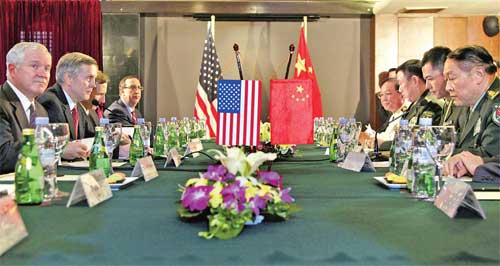Foreign and Military Affairs
US defense chief to visit China
By Li Xiaokun (China Daily)
Updated: 2010-10-12 06:36
 |
Large Medium Small |
HANOI - Defense Minister Liang Guanglie on Monday invited US Secretary of Defense Robert Gates for a visit early next year, ending an impasse between the two militaries following Washington's massive arms sale to Taiwan earlier this year.
 Defense Minister Liang Guanglie (right) meets US Defense Secretary Robert Gates (left) in Hanoi on Monday ahead of an inaugural meeting of Asia-Pacific defense ministers. [Photo/Agencies] |
Gates accepted the invitation, said Guan Youfei, deputy director of the foreign affairs office of the Defense Ministry, at a press conference after the meeting.
| ||||
They held the 50-minute talks before a session of defense ministers of 10 Southeast Asian nations and regional powers to begin on Tuesday.
China broke off military relations in January over US plans to sell Taiwan more than $6 billion worth of arms, including Blackhawk helicopters and Patriot missiles. The US has since tried to push for a resumption of military contacts.
In June, China rejected a proposal for a visit by Gates, saying it will invite him "at a proper time".
Monday's talks started lightly, with Liang asking Gates casually: "Who should start first, you or me?"
But the two delegations were extremely cautious in every detail of the meeting. They did not choose either of the two hotels that the two men were staying at for the meeting to avoid the implication that any side was the host.
Reporters were only allowed to stay in the meeting room for less than a minute.
Guan also said Ma Xiaotian, deputy chief of the general staff of the People's Liberation Army, is scheduled to visit Washington in the near future.
Actually, China only suspended high-level military exchanges with the US, with those at lower levels still going on, he said. China and the US will hold talks on maritime security in Hawaii on Oct 14 and 15.
Liang said military relations constitute an important part of bilateral relations, which are of increasing global influence. Currently, the two countries are facing some problems in developing military relations, with the US arms sale to China's Taiwan being the main reason, he noted. "The biggest obstacle in defense relations between the US and China is US arms sales to Taiwan."
It is important for the two countries to respect and care for each other's core interests, and continuously consolidate strategic mutual trust in order to develop military ties in a stable way, he said.
Gates told Liang he hoped military ties with Beijing "will not be decided by the discrepancies but by mutual interests and responsibilities".
He said the talks were "constructive" and represented "a good forward step".
Senior Colonel Zhao Xiaozhuo, an expert on US military affairs at the Beijing-based Academy of Military Science, said that the visit invitation is a sign that military ties are back on track.
"Sino-US military ties have witnessed ups and downs during the past decades in response to changing political relations," Zhao said, noting that military relations are the most sensitive part of bilateral relations.
Relations soured lately due to US interference in the South China Sea issue and its joint naval drill on the Yellow Sea with the Republic of Korea.
"Both countries know that a healthy relationship serves regional, and even world peace. China has to make it clear that its core interests tolerate no infringement," Zhao said.
Pan Zheng, a researcher at the PLA's National Defense University, said the invitation is in response to positive efforts by the US to improve relations.
Guan said the talks did not touch upon the South China Sea issue.
Ma Liyao, Xinhua contributed to this story.










